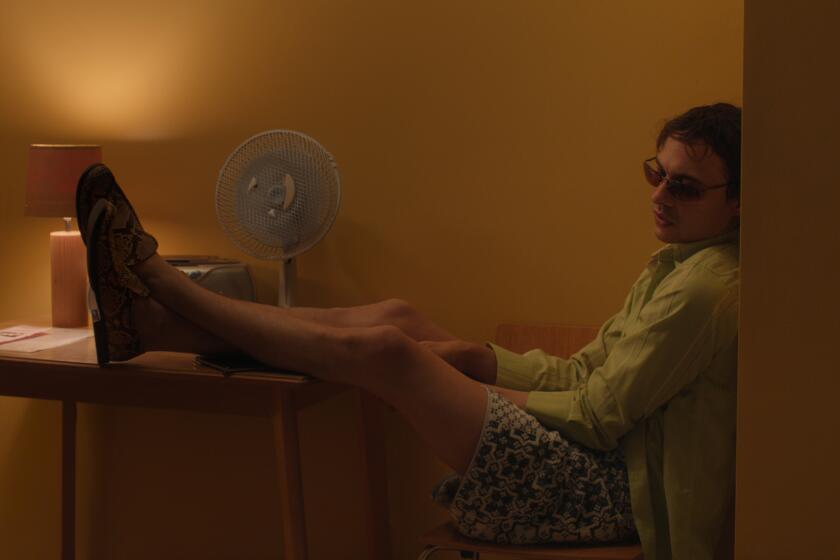Unforgettable Journey of ‘Lamerica’
- Share via
“Lamerica” is a miracle, a reason to believe. Dramatic, intelligent, insightful and ambitious, this exceptionally moving film is strong enough to rank with the masterworks of Italy’s cinema. In a town that believes that box office is the sole test of greatness, it is both chastening and heartening to encounter the real thing.
The path of films of piercing quality is not, however, an easy one. Though it won numerous awards in Italy, as well as the prestigious Felix for best European film of 1994, “Lamerica” was ignored by the Academy Awards’ predictably fallible foreign language committee. And it arrives in Los Angeles nearly a year after its New York Film Festival debut, at only one theater (the Nuart in West Los Angeles) for only one week. It’s enough to make you weep.
A profound emotional experience, “Lamerica’s” always-human story touches delicately but tellingly on questions of personal and national identity, on the immigrant’s desire to better himself elsewhere and the stranger’s parallel passion to return home. Its title, an unlettered reference to the United States, is as much metaphor as anything else, an allusion to the fabled place of dreams that is finally as elusive as El Dorado.
“Lamerica” is only the third theatrical feature (the first, “Open Doors,” was Oscar nominated, and the second, “Stolen Children,” won the Grand Jury Prize at Cannes) for director Gianni Amelio, a quiet but forceful filmmaker whose natural empathy with his characters and adept use of non-professional actors places him directly in the Italian neo-realistic tradition.
Like “Stolen Children,” which followed a carabiniere as he escorted a child prostitute and her brother across Italy to a new home, “Lamerica” uses the device of a geographical journey to move characters on unexpected voyages of interior discovery.
And with “Lamerica,” the director himself took a journey, for this film is entirely shot in Albania, just 70 miles across the Adriatic from Italy’s boot. Perennially impoverished, Albania, as old newsreel footage that runs alongside “Lamerica’s” opening credits shows, was invaded by Italy in 1939 and forced into an unequal political union “in the name of fascism.”
In 1991, the year “Lamerica” is set in, a new pair of opposing invasions is taking place. On the one hand, thousands of Albanians, desperate to improve their lot, are pouring into port cities, intent on fleeing over the water to the earthly paradise they’ve glimpsed on glossy Italian TV.
*
Coming into Albania from Italy, on the other hand, are exploiters looking to make a profit out of the country’s desperation and naivete. Fiore and his young partner Gino (Michele Placido and Enrico Lo Verso, the film’s only professional actors) are practiced and prosperous deceivers who are looking to set up a dummy corporation that will take advantage of the Albanians while bilking money from the Italian government.
Arrogant about their wealth and contemptuous of the desperate locals, Fiore and Gino need a docile Albanian figurehead to head their board of directors. In the disease-ridden ruins of a former prison camp, they come across their ideal man: Spiro Tozai (Carmelo Di Mazzarelli).
Encrusted with the misery of half a century in detention, Spiro has so lost touch with reality he thinks he’s 20 years old. Incontinent, unwilling to speak, possibly feeble-minded, Spiro is capable only of signing his name, which is all the Italians care about.
Fiore heads back to Italy, which means that Gino is left alone when a crisis occurs. Spiro is needed to sign more papers, but the old man has precipitously fled from the orphanage where he’s been incongruously warehoused and Gino, much against his will, has to head out into Albania proper to find him.
It’s a journey into a world of unimaginable chaos that, like a bog, sucks Gino in deeper and deeper, involving him in complex and unforeseen emotional situations. With his illusions and his bravado gradually peeled off the way the wheels are stripped from his expensive car, Gino is forced to confront the implications of his own and his country’s history and culture when he discovers that Spiro Tozai has a voice after all.
Enrico Lo Verso, who starred in “La Scorta” and “Farinelli” as well as playing the wistful carabiniere in “Stolen Children,” is an ideal actor for director Amelio’s aims. With soft, pouting lips and sad eyes, he has a face to which emotional confusion comes easily, a face that can make the transition from arrogance to uncertainty believable.
The wonder of this film, however, is 80-year-old Carmelo Di Mazzarelli, a retired fisherman Amelio met by chance on a pier. With no previous acting experience, Di Mazzarelli has, in the tradition of neo-realism, been able to give a performance that seems to go beyond acting to convey something essential about the human spirit.
As much as any of the actors, Albania and its people are critical to “Lamerica’s” success. Amelio has a particular gift for faces and types, picking images--like a tiny girl doing slick hip-hop dance moves in a ruined hotel--that are indelible. It’s only one of the many things to marvel at in this remarkable, unforgettable film.
* Unrated. Times guidelines: mature subject matter.
(BEGIN TEXT OF INFOBOX / INFOGRAPHIC)
‘Lamerica’
Enrico Lo Verso: Gino
Michele Placido: Fiore
Carmelo Di Mazzarelli: Spiro
Piro Malkani: Selimi
Released by New Yorker Films. Director Gianni Amelio. Producers Mario & Vittorio Cecchi Gori for C.G. Group Tiger. Executive producer Enzo Porcelli for Alia Film. Screenplay Gianni Amelio, Andrea Porporati, Alessandro Sermoneta. Cinematographer Luca Bigazzi. Editor Simona Paggi. Costumes Liliana Sotira, Claudia Tenaglia. Music Franco Piersanti. Set designer. Running time: 1 hour, 56 minutes.
* Exclusively at the Nuart, 11272 Santa Monica Blvd., West Los Angeles, (310) 478-6379.
More to Read
Only good movies
Get the Indie Focus newsletter, Mark Olsen's weekly guide to the world of cinema.
You may occasionally receive promotional content from the Los Angeles Times.











